The Top 3 Emotions of Every Myers-Briggs® Personality Type
Ever wonder why some emotions seem to show up more frequently in your life than others? Whether it’s anxiety that pops up during a hectic day or bursts of excitement over something new, emotions shape how we experience life and interact with others. I recently conducted a survey with over 5,000 people—friends, clients, email subscribers, and social media followers—and asked one question: “Which 1-3 emotions do you feel most regularly throughout your day?” The answers revealed some fascinating patterns, with certain emotions appearing more frequently based on personality type.
Here are the options that each type could choose from:

- Joy
- Shame
- Anxiety
- Contentment
- Restlessness
- Disgust
- Anxiety
- Pessimism
- Excitement
- Boredom
- Disappointment
- Anger
- Optimism
- Pride
- Calmness
- Sadness
- Fear
- Confusion
- Gratitude
- Envy
- Hopefulness
Today we’re going to see which emotions each type selected the most, and then look at why those emotions in particular stood out. Ready to get started? Let’s begin!
Table of contents
- INTJ – Anxiety, Restlessness, Calmness
- ENTJ – Restlessness, Joy, Gratitude
- INFJ – Anxiety, Gratitude, Calmness
- ENFJ – Optimism, Joy, Hopefulness
- ISTJ – Anxiety, Contentment, Sadness
- ESTJ – Restlessness, Optimism, Contentment
- ISFJ – Anxiety, Gratitude, Hopefulness
- ESFJ – Gratitude, Anxiety, Optimism
- INTP – Anxiety, Calmness, Boredom
- ENTP – Hopefulness, Optimism, Excitement
- INFP – Anxiety, Hopefulness, Gratitude
- ENFP – Joy, Optimism, Excitement
- ISTP – Hopefulness, Calmness, Optimism
- ESTP – Optimism, Restlessness, Calmness
- ISFP – Anxiety, Contentment, Restlessness
- ESFP – Gratitude, Optimism, Hopefulness
- What Do You Think?
Estimated reading time: 22 minutes
INTJ – Anxiety, Restlessness, Calmness
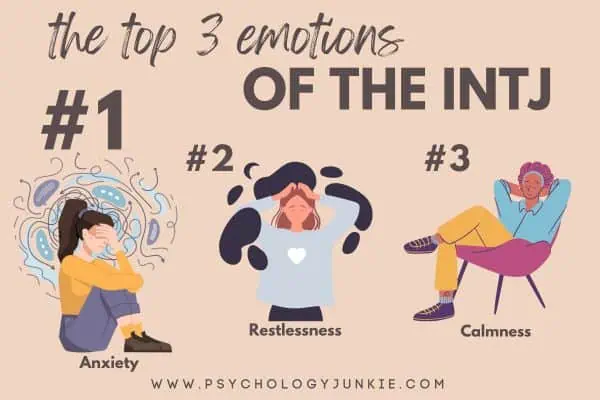
Anxiety takes the top spot. For INTJs, their Introverted Intuition (Ni) constantly envisions various possibilities, and this focus on the long term can create a sense of urgency and anxiety to make their visions a reality. An INTJ once shared with me, “I feel most anxious when I think I might have missed a critical detail that could affect my plans. My low Se (Extraverted Sensing) means that the fine details can really undermine me.” They are often their harshest critics, and this inner pressure can lead to bouts of anxiety.
Restlessness comes in second. INTJs are driven by their goals, and when they’re not making progress or feel stuck in the mundane, restlessness sets in. “I hate wasting time. I need to be doing something meaningful,” said one INTJ. Productive and visionary, they feel unsettled when they aren’t making momentum towards their ideas and objectives.
Calmness rounds out the top three. I know it seems like a contradiction coming right after anxiety and restlessness, but here we are. As Introverted Intuitives, INTJs get their best insights and epiphanies when they can quiet the noise and chaos of the world and enter a state of calm. Cutting off sensory stimulation and silencing their senses allows them to look inward and find patterns, meaning, and deeper insights. When INTJs prioritize calm, they make room for their intuition to shine.
Find out more about INTJs: 27 Signs That You’re an INTJ, the Strategist
ENTJ – Restlessness, Joy, Gratitude
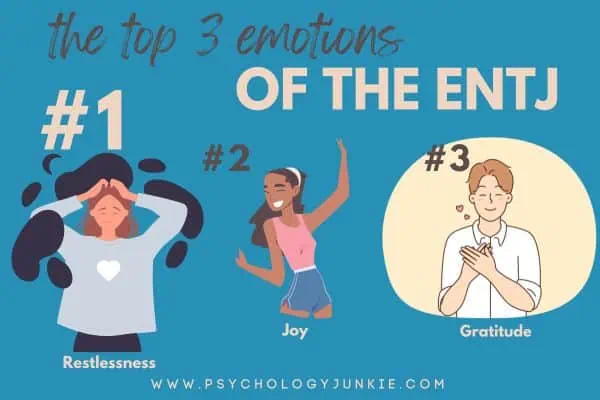
Restlessness is the most commonly reported emotion for ENTJs. ENTJs are driven by a desire to make progress and achieve their goals. They have big ideas and limited time to make those ideas a reality. When they aren’t moving forward or feel like they’re stuck in inefficiency, restlessness quickly takes over. The clock starts to feel like it’s ticking too fast and everything feels way too slow. “I hate feeling like I’m wasting time. I need to be productive,” said one ENTJ. Their dominant Extraverted Thinking (Te) keeps them focused on efficiency, and when things slow down, they feel agitated.
Joy comes in second. As forward-thinkers, ENTJs have big ideas they are constantly working towards. This ability to imagine a possibility and then work to bring it alive creates a lot of gratification and meaning for the ENTJ. While we talk a lot about ENTJs and how much they like to work and accomplish tasks, they also seek out meaning and depth. Thanks to their Introverted Intuition, they are interested in the bigger picture, the meaning of life, and the deeper meaning of everything. This focus on the profound can give them a sense of significance, meaning, and deep joy.
Gratitude rounds out the top three. ENTJs know how to maximize resources and organize their lives to achieve their goals. This ability can give them a sense of gratitude and optimism; a sense that they can achieve anything if they try hard enough. I’d love to hear from more ENTJs in the comments if you have insights as to why gratitude ranked so highly for you! I can hypothesize, but I didn’t get a lot of comments from ENTJs on this.
INFJ – Anxiety, Gratitude, Calmness

Anxiety came in first place for INFJs. They tend to take on a lot of emotional chaos from the world around them; absorbing people’s feelings and trying to make life more harmonious for everyone. But the downside to that is that it can leave them drained, emotionally overwhelmed, and depleted. On top of that, INFJs are pattern-seers and they have a tendency to spend a lot of time envisioning and anticipating future events. This tendency to be out of the present can spark anxiety because it creates a disconnect from the moment, creating anticipatory anxiety for situations that aren’t here yet. You can find out more about this in my article on anxiety and the 16 personality types.
Gratitude came in second. INFJs tend to take a big-picture view of life, and with it they see the significance and meaning in each moment. Having a grateful perspective rather than a pessimistic one helps them to see the beauty in what otherwise might be a mundane experience.
Calmness rounds out the list. Even with anxiety in first place, INFJs still prioritize calm. When they shut off the noise and quiet down their senses they can really get into the zone and reach a flow state. Being present in a quiet, peaceful state helps them to get their best insights, epiphanies, and inspirations. This is why healthy INFJs prioritize calmness and quiet time, making space for their deeper insights to bubble up to the surface.
Find out more about INFJs: How INFJs Say “I Love You”
ENFJ – Optimism, Joy, Hopefulness

For ENFJs, optimism tends to be the default setting. They see potential in everyone and everything, and their strong belief in the power of connection keeps their spirits high. Because they place such a high priority on friendships and intimacy, they often have strong support groups and people to turn to when life gets rocky. They’re often the first to rally the troops and inspire hope, no matter how bleak things might look.
Joy came in second for ENFJs. For ENFJs, a life of meaning is more important than a life of material gratification. They look for the profound in every moment of life and enjoy connecting with people on a deeper level than most. Sharing experiences, emotions, and insights with others gives them a sense of joy and infuses their life with a depth that sustains them.
Hopefulness rounds out the list. Even when things aren’t perfect, ENFJs hold on to hope that with the right actions and support, everything can improve. “Hope is what keeps me going, especially when the world feels overwhelming,” an ENFJ explained. They’re always looking to build a better future, both for themselves and the people they care about.
ISTJ – Anxiety, Contentment, Sadness

More than anything else, anxiety got the most votes for ISTJs. In fact, in our survey on type and anxiety, ISTJs were the 2nd most likely type to feel anxiety. For ISTJs, anxiety often kicks in when they feel things are slipping out of their control or when they fear they haven’t prepared enough for potential problems. Dealing with uncertainty, unknowns, and unpredictability drives these normally calm, studious types to a state of charged stress.
Coming in second was Contentment. ISTJs believe in making the best of what’s around them and often find joy in simple pleasures like a morning walk, the taste of freshly brewed coffee, or gathering with the family for a meal. While certain other types are perpetually thinking to future scenarios, ISTJs work to create a sense of tradition and stability. They try to find joy and beauty in the small details that many other people rush by.
Coming in third was Sadness. ISTJs were the types with the most votes for sadness, and I found this surprising. Beneath their often stoic exterior, ISTJs are more sensitive than they appear. They also tend to have a sentimental, nostalgic side and can dwell on bittersweet memories for a long time. “I don’t think sadness is necessarily bad,” one ISTJ commented, “I think it makes life more meaningful.” Another said, “I feel like I have to keep it together for everyone else, but I’m actually really sensitive.”
Discover more about ISTJs: 21 Hobbies That ISTJs Love
ESTJ – Restlessness, Optimism, Contentment

Restlessness is the number one emotion for ESTJs. These efficient, go-getter types always feel the need to be productive, and when things slow down or become stagnant, restlessness takes over. “I hate being idle,” one ESTJ remarked. “If I’m not moving forward or making progress, I feel like I’m wasting time.” This drive is fueled by their dominant Extraverted Thinking (Te), which pushes them to set goals and achieve results, often making them impatient when things don’t happen fast enough.
Optimism comes in second for ESTJs. Even though they can feel restless, they have a lot of confidence in their ability to get things done and achieve their goals. “I always believe I can make things better,” one ESTJ shared. This sense of optimism fuels their determination and helps them stay focused, even in difficult situations.
Contentment rounds out the top three. While ESTJs thrive on progress, they also appreciate the satisfaction that comes with completing a task or reaching a milestone. And as Sensing-Judgers, they appreciate the little things in life that bring a sense of satisfaction. SJ types notice the fine details and take joy in them. From the crisp feel of autumn approaching to the warmth of a cozy blanket, SJs try to fully appreciate the little pleasures of the here-and-now.
ISFJ – Anxiety, Gratitude, Hopefulness
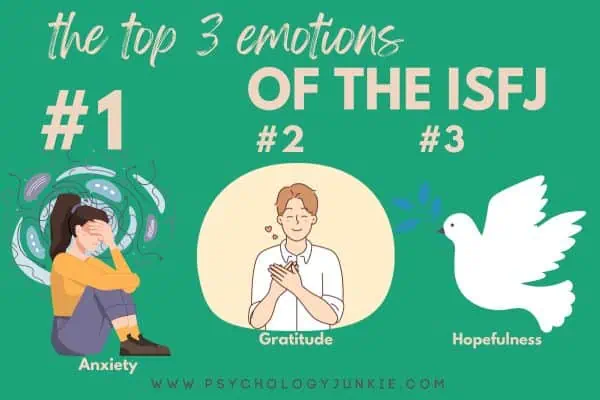
Anxiety came in first for ISFJs with 22.36% of ISFJs saying they regularly experience it. ISFJs, like ISTJs, crave stability and the sense that they know what tomorrow will hold. Instability, uncertainty, and a lack of routine can make them feel overwhelmed and lost. They also tend to take on a lot of responsibilities, being seen as caregivers and emotional supporters. Sometimes this means they put their needs last and wind up burned out and overwhelmed as a result.
Gratitude comes in second. ISFJs are deeply appreciative of the people in their lives and the small comforts they’ve built into their routines. A warm hug, a family meal, or a brisk autumn walk can all put them in touch with the small details that ultimately give life meaning. “I feel grateful for having a stable home, close friends, and time with my family,” one ISFJ commented.
Hopefulness rounds out the top three. Even if the world around them feels unstable and uncertain, many ISFJs work hard to create supportive relationships and communities that bolster their emotional strength. I’ve known quite a few ISFJs who struggle with anxiety but find hope in their friendships, families, or religious traditions.
Find out more about ISFJs: The Two Sides of the ISFJ Personality Type
ESFJ – Gratitude, Anxiety, Optimism

Gratitude is the most frequently reported emotion for ESFJs. Known for their nurturing and caring nature, ESFJs often feel grateful for the people in their lives and the opportunity to take care of them. “I feel blessed to have a supportive family and close friends,” one ESFJ shared. Their dominant function, Extraverted Feeling (Fe), is focused on building relationships and fostering harmony, which helps them to feel connected, affirmed, and supported. According to the American Psychological Association, people with strong friendships are more satisfied with their lives and less likely to suffer from depression. In my study on type and friendships, ESFJs felt it was easy to make new friends and most had a solid support group. These factors may contribute to their overall sense of gratitude with life.
Anxiety comes in second. For ESFJs, a life that is stable, tranquil, and full of supportive relationships is key. When life seems unpredictable, unstable, or ever-changing, they experience a lot of anxiety. On top of that, many ESFJs struggle to prioritize their personal needs, instead focusing on other people and their needs. This can lead to a sense of anxiety when their repressed needs flare up during stressful moments.
Optimism rounds out the top three. It seems like a contradiction coming in right after anxiety, but optimism came in as number 3 for ESFJs. They bolster their strength by having a strong sense of community, friendship, and stability. While some types take on a lone-wolf mentality, ESFJs instead believe that anything is possible if they have the right team of friends or family members on their side.
Discover more about ESFJs: 10 Things ESFJs Need in a Relationship
INTP – Anxiety, Calmness, Boredom

For INTPs, anxiety came in first place. They often feel misunderstood in the world; too analytical, too skeptical, too introverted. They can struggle to find their place socially and often feel like it’s harder to share their personal feelings. On top of that, they can get caught in loops of overthinking, analyzing every possible outcome to the point of paralysis. The fast world of today with all its distractions and deadlines can be the antithesis to the calm environment INTPs naturally crave. One INTP described their anxiety as “getting lost in a labyrinth of my own making.” Another said, “I am seen as cold or strange when I need time alone and people constantly misunderstand me. But if I try to be as extroverted as the people around me I’m completely drained.”
Calmness came in second. INTPs have an incredible ability to retreat into their minds, where they feel safe and in control. Their dominant function, Introverted Thinking (Ti), helps them maintain a sense of inner calm, especially when they can dive into their thoughts without distractions. They enjoy tinkering with ideas, possibilities, and analysis. One survey respondent commented, “I feel calm when I’m left alone to figure things out. My mind is my safe place.”
Finally, boredom rounds out the top three. INTPs are wired to seek novelty, especially in intellectual pursuits. When they’re stuck in mundane routines or repetitive tasks, boredom quickly sets in. “Boredom is the enemy of my existence,” one INTP remarked. They are happiest when they have a lot of mental stimulation, intellectual sparring opportunities, and ideas to explore in-depth. But life can sometimes feel like a set of rules, routines, and responsibilities that leaves no room for freedom and novelty.
Find out more about INTPs: How INTPs Say “I Love You”
ENTP – Hopefulness, Optimism, Excitement
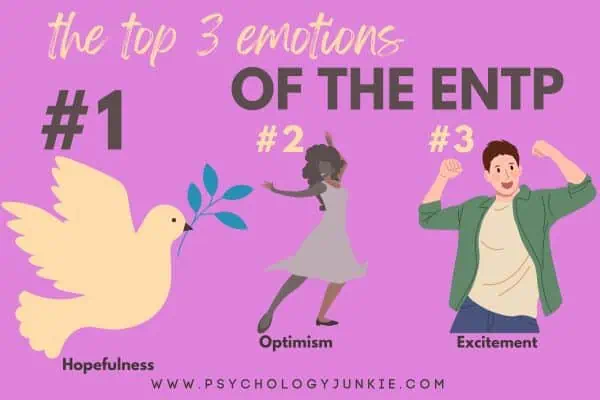
ENTPs, known for their enthusiasm and creativity, reported feeling hopeful more than any other emotion. Their dominant function, Extraverted Intuition (Ne), drives them to see endless possibilities, and this naturally leads to a hopeful outlook. “Even when things are tough, I can always see a way forward,” said one ENTP. They tend to believe that with enough ingenuity and effort, any problem can be solved.
Optimism comes in second. ENTPs are future-oriented thinkers who are always looking for ways to improve things, whether in their personal lives or in the world around them. This optimism is closely tied to their ability to brainstorm creative solutions to challenges.
Excitement rounds out the top three. ENTPs are inspired by new experiences, ideas, and challenges, and they often feel a rush of excitement when they embark on a new venture. “I get excited by the unknown and all the things I haven’t explored yet,” said one ENTP. Their love for novelty and adventure keeps their life full of energy and anticipation.
INFP – Anxiety, Hopefulness, Gratitude

For INFPs, anxiety tops the list of emotions. This sensitive, introspective type often feels at odds with a world that seems to focus far more on materialism and image than meaning. They often feel like misfits in a world of conformists, and their need for a life of profound meaning over day-to-day pursuits is often undermined by endless tasks. One INFP in our survey explained, “I feel like I’m carrying the weight of the world on my shoulders, even though I know I can’t fix everything.” Another commented, “I struggle with anxiety; I don’t feel like the world around me sees or appreciates my gifts. Everyone around me has always pushed me to be more like my ESFJ sister. I’m too quiet, less organized, clean, ambitious. But they don’t see my creativity, depth, or writing abilities.”
Hopefulness comes in second. INFPs are idealistic and believe in the potential for positive change, both in themselves and the world around them. They have rich imaginations and the capacity to envision possibilities where others see only roadblocks. When life feels chaotic or overwhelming, they often find inner strength in their imagination and hope for a better future.
Gratitude rounds out the top three. Many INFPs look for a life of significance over a life of material abundance. Because of this, they are apt to find it, even if it’s in unlikely places. They see beauty in the things that other types might find mundane, and they see possibility and potential in everything around them. Even the most everyday experiences can be infused with personal meaning for the INFP, and this talent for creating meaning is something that gives INFPs a great deal of inner strength.
Discover more about INFPs: 27 Remarkable INFP Anime Characters
ENFP – Joy, Optimism, Excitement

I love that Joy was voted as the ENFP’s #1 emotion, because I always think of Joy from Inside Out when I think of ENFPs. These free-spirited types are known for their charisma, ingenuity, and enthusiasm for new ideas and possibilities. Their dominant function, Extraverted Intuition (Ne), constantly seeks out potential. As one ENFP put it, “I love waking up each day wondering what new adventure or idea will come my way.”
Optimism came in second. Even in the face of setbacks, ENFPs tend to maintain a hopeful attitude. They can often see inspiring possibilities in situations that seem hopeless to other types. In fact, some ENFPs even like challenges because it gives them the opportunity to brainstorm and “save the day!” This optimism keeps them motivated and helps them push through difficult times with a sense of hope.
Excitement rounds out the top three. ENFPs are excited by new ideas, theories, and opportunities. They thrive on novelty and are always looking for the next big thing to inspire them. Every moment has the opportunity to become life-changing in their minds. There’s possibility literally everywhere. “I get excited about pretty much anything—new hobbies, new places, new people,” one ENFP commented.
Find out more about ENFPs: The Unhealthy ENFP
ISTP – Hopefulness, Calmness, Optimism

Hopefulness might seem unexpected for a cool-headed ISTP, but under that calm surface is a quiet belief in their ability to handle anything life throws their way. As one ISTP said, “I don’t know what’s coming, but I know I’ll figure it out.” This confidence comes from their ability to break down problems and see clear solutions. It’s like having a mental toolbox—there’s always something in there to fix what’s broken.
Calmness came in second for ISTPs. They tend to stay cool and contained, no matter what life throws at them. Surprise crisis? No big deal for an ISTP. Their brains are wired to react to the unexpected, and many times they feel a little bored if there isn’t a challenge.
Optimism rounds out the list. ISTPs tend to be quietly optimistic, knowing they’ll find a way through. They’re not the cheerleading type necessarily, but they’re practical optimists. “I don’t need to believe everything’s perfect, I just need to know I can handle it,” one ISTP explained. Their optimism is more about confidence in their abilities than blind hope.
ESTP – Optimism, Restlessness, Calmness

Optimism is the bread and butter of an ESTP’s life. “I see a problem, I fix it. Simple.” For these action-oriented types, life is full of challenges waiting to be tackled, and their confidence in their ability to handle just about anything keeps their outlook positive. I’m married to an ESTP so I see this optimism every day. They don’t want to waste a second worrying about what “might” happen when they can make lemonade out of lemons right now.
Restlessness is a close second. ESTPs have a hunger to amp up the moment and make it as immersive as possible. They have an adventurous spirit and a desire for action and rich experiences. They’re always looking for the next big thing, and if life slows down, restlessness sets in fast.
Calmness? Surprisingly, yes. While ESTPs love action, they find peace when they’re in the thick of it. Whether they’re working on a project or in the middle of a high-stakes situation, they find calm by focusing on the present moment. My ESTP husband often talks about how he gets into a flow state when he’s fully immersed in an action, whether that’s driving in a busy city, hiking a challenging route, or even playing table tennis!
ISFP – Anxiety, Contentment, Restlessness

For ISFPs, anxiety came in first. They often feel overwhelmed by a world that expects them to “fit in” and be like everyone else. They are free spirits and individualists and hate feeling like they’ve got to put on a mask or be something they’re not. One ISFP confided, “I feel anxious when I can’t do what I love to ‘make it’ in the world. When I have to mask my true nature and conform.”
Contentment came in second for ISFPs. One thing that ISFPs are skilled at is staying present in the moment and quieting out worries about worst-case scenarios or future possibilities. They enjoy staying connected to their environment and fully savoring each detail. While another type might chug a mug of coffee while worrying about work tasks, an ISFP takes the time to fully savor each sip, focusing on each nuance of flavor. This ability to stay present and richly enjoy each moment can help ISFPs to feel more content with life.
Restlessness rounds out the top three. ISFPs need freedom—freedom to explore, create, and live life on their terms. When that freedom is restricted, restlessness sets in fast. “If I can’t express myself or if life feels too rigid, I start to feel like I’m suffocating,” one ISFP shared. I’ve written more about this here: Why ISFPs Need Freedom to Thrive
ESFP – Gratitude, Optimism, Hopefulness
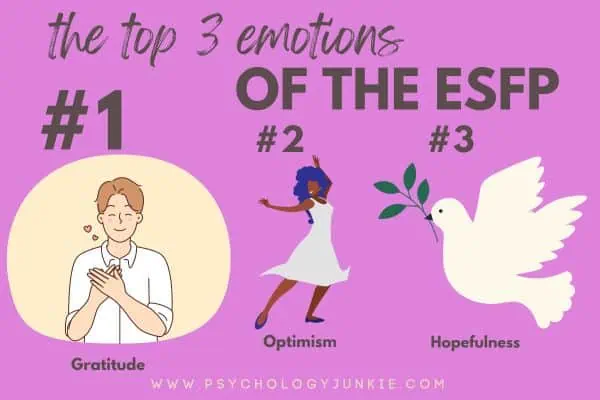
Gratitude came in first place for ESFPs. These fun-loving, present-focused individuals often feel grateful for the experiences they’re able to have and the friends they get to share them with. “I feel so lucky to have good friends and to enjoy life the way I do,” one ESFP commented. Their dominant Extraverted Sensing (Se) keeps them grounded in the present, aware of each detail, finding beauty and opportunity in everything.
Optimism comes in second. ESFPs love spontaneity and finding last-minute adventures to embark on. Making the most out of each moment is their goal, and they don’t want to waste a minute worrying about abstract possibilities or worst-case scenarios. After all, life is short and they want to make each moment count! When life gets challenging, they often use their resourcefulness and optimism to find opportunities and solutions that others miss.
Hopefulness rounds out the top three. ESFPs enjoy thinking about all the fun experiences life has in store for them. They tend to collect these experiences, filling each moment with friendship, fun, laughter, or adventure. I have an ESFP friend here who’s calendar is always full of camping trips, parties, outings with friends, and outdoor excursions. They always seem excited about tomorrow, because there’s always something stimulating and new on the agenda.
What Do You Think?
What are your top three emotions? Would you like to contribute to the survey? You can be a part of it here. I’d love to hear any insights you have in the comments! You can also find out even more about your personality type in our eBooks, Discovering You: Unlocking the Power of Personality Type, The INFJ – Understanding the Mystic, The INTJ – Understanding the Strategist, and The INFP – Understanding the Dreamer. You can also connect with me via Facebook, Instagram, or Twitter!

Subscribe to Our Newsletter

Want to discover more about personality type? Get the inside scoop with Susan Storm on all things typological, along with special subscriber freebies, and discounts on new eBooks and courses! Join our newsletter today!













ISTJ here. I definitely relate to sadness lately, especially as I’m finding myself really missing someone I haven’t seen, or even heard from, in nearly 30 years, a couple of years after high school, where she and I met during our senior year.